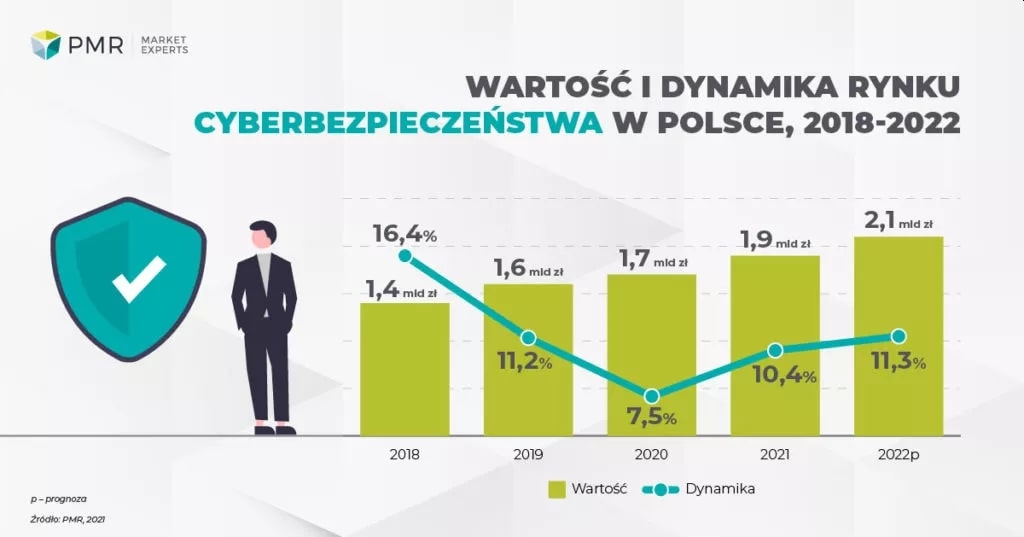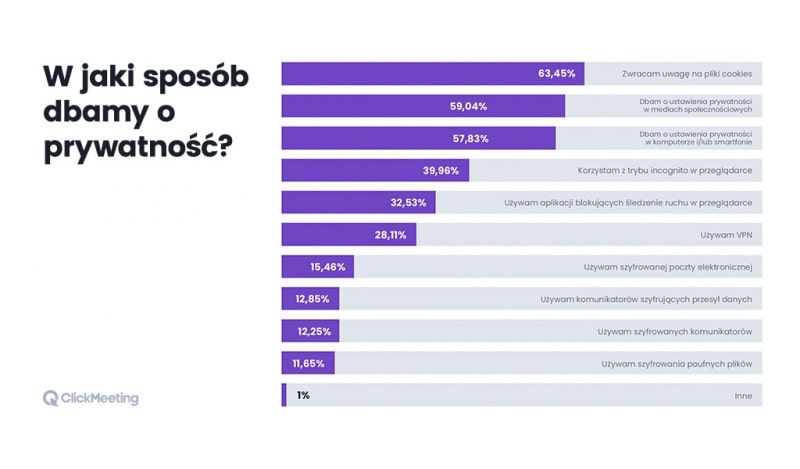 source: PMR, Cybersecurity Market in Poland 2021
source: PMR, Cybersecurity Market in Poland 2021The latest PMR report, "Cybersecurity Market in Poland 2021. Market Analysis and Development Forecasts for 2022-2026," indicates that 2021-2022 marks a return to double-digit growth in cybersecurity spending in Poland. The market value will clearly exceed PLN 2 billion next year.
The pandemic undoubtedly dominated the economic situation across the country, affecting the ICT market and its various segments, including cybersecurity. Forced digital transformation of companies - primarily through the shift to remote work - favored cloud providers, data centers, telecom operators, and VPN services.
Securing distributed corporate resources, often used in a hybrid model with remote access, became critically important. The year 2021 saw a general rebound in the market. In some areas, there were unprecedented growth rates, with customer demand sometimes limited only by supply shortages and disrupted supply chains.
Large companies remain the main consumers of IT in Poland, accounting for 58% of the total cybersecurity market value in 2021. Among industry sectors, B2B leaders include:
- banks and financial institutions,
- and the telecommunications sector,
where investments in cybersecurity are driven by the nature of their business. In the telecommunications sector, upgrades and investments in new IT systems, as well as integration of existing resources, positively impacted cybersecurity providers` revenues. In addition, in 2021, VOD providers and multimedia content services in Poland demonstrated significant spending.
More companies are considering cloud solutions and remote work in the long term, no longer viewing cybersecurity as a barrier to such changes. As cloud adoption grows, organizations are expected to rely more on IaaS solutions from major public cloud providers, potentially limiting budgets for traditional cybersecurity solutions but boosting sales to data centers and large hyperscalers. The increasing popularity of cloud-based application security solutions and offering applications as a service is expected to make these options more accessible to a broader range of organizations.
In terms of threats, the Polish market is only slightly different from global trends, mainly because Polish companies do not operate in isolation, and large organizations are often linked to foreign entities.
In the coming years, applications, services, and platforms will require careful protection, and organizations will face a growing risk of external attacks associated with the rising popularity of cloud environments, remote work, and remote access to resources.
More information is available in the PMR report: "Cybersecurity Market in Poland 2021"
Over 57% of Poles believe they care about their online privacy
Meanwhile, a survey conducted by ClickMeeting reveals that almost all respondents recognize the importance of protecting privacy during various online activities.
- 57% claim they always care about their online privacy,
- 40.6% try to, though not always,
- only 1% don’t know how to protect it and thus take no action,
- just under 1% said online privacy doesn’t matter to them.
According to data from February 2022 on internet, radio, and television consumption, 30 million people in Poland use the internet, with 25.5 million online daily. Given this, ClickMeeting decided to explore how people protect their privacy and the tools they use.
 source: ClickMeeting study
source: ClickMeeting studyThe survey shows that the largest percentage of Polish internet users pay attention to cookies (63.4%). Nearly 60% focus on privacy settings on social media, and 57.8% on privacy settings on their computer and/or smartphone. They also consider browser settings, using incognito mode (nearly 40%) or tracking-blocking applications (32.5%), and 28% use VPN services. Some also use solutions such as encrypted email (15.5%), data-encryption messaging apps (12.8%), and encrypted communicators (12.2%), with 11% using tools to encrypt confidential files.
Online events and privacy
Companies are increasingly using online solutions to conduct and promote their business. Consequently, events previously held in person have moved online. Webinars, for instance, have gained popularity, with their duration increasing by 16 minutes in 2021 compared to 2020, according to ClickMeeting.
Ads know you before you see them. Say hello to predictive AI analytics 👇
While the primary considerations for internet users in choosing such events remain content quality and invited experts, ClickMeeting investigated how important privacy is for participants. It turns out that:
- 73.7% of respondents want webinar organizers to ensure their privacy,
- just under 20% are indifferent,
- 4.8% declared they don’t pay attention to this aspect.
- According to ClickMeeting data, nearly 20% of events on the platform were marketing and PR-focused, with 16% supporting direct sales - says Dominika Paciorkowska, Managing Director and Board Member of ClickMeeting. - This shows that, like other areas, business is also moving online, where we want to feel secure. This is no different for online events.
COMMERCIAL BREAK
New articles in section Law in media
Dietary supplement ads in Poland. Who keeps influencers in check?
Newseria, KFi
One in three Polish internet users considers influencer recommendations when deciding on medicines and dietary supplements. Although promotion of such products is regulated, there are still cases of advertising that skirt the law.
SEO Poisoning. Hackers Use Search Engines to Target Businesses
Piotr Rozmiarek
Search engines help us quickly find information, but they can also be used by cybercriminals. SEO poisoning is a tactic where attackers manipulate search engine rankings to place harmful websites at the top of search results.
Phishing in the Cryptocurrency Industry. Fake Recruitments Steal Data
Piotr Rozmiarek
Security researchers have detected a social engineering campaign targeting job seekers in the Web3 industry. The attack aims to conduct fake job interviews via a meeting application that installs information-stealing malware.
See articles on a similar topic:
GDPR and Press Releases. Is Journalists' Consent Required?
BARD
After May 24, will it be possible to send press releases to journalists without concern, or is it safer to obtain their consent? Industry experts and lawyers explained GDPR regulations on this topic to infoWire.pl news agency journalists.
How to Detect Pegasus on Your Phone and Protect Against Spying
RINF
The nature of spyware is to remain as hidden as possible, making it difficult to detect on a device. However, some mechanisms can help verify if a smartphone has been compromised.
Local Media in Poland - Corrections
Bartłomiej Dwornik
The regulations regarding corrections are perhaps the most frequently violated rule in Polish media. There is a clear division between those who never admit to mistakes and those who can humbly accept their faults.
Cyber Threats 2023: Phishing Dominates, AI Targeted
Krzysztof Fiedorek
The CERT Orange Polska 2023 report reveals a rapidly evolving cyber threat landscape. Phishing has taken a decisive lead, accounting for over 44% of reported incidents. Advanced social engineering techniques, deepfakes, and a surge in malicious ads lure users with promises of quick profits or easy opportunities.





























